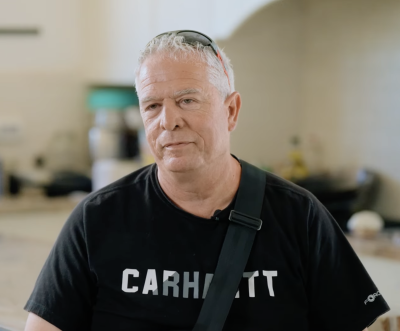"We Just Wanted to Live Peaceful Lives"
It was just after dawn when the rockets began to fall.
In a quiet farming village near the Gaza border, Yossi awoke to the sound of explosions. The Iron Dome battery behind his house roared to life, rattling the walls. His wife rushed to gather their four sons—ages five to eleven—into the bomb shelter. But it wasn’t just missiles that morning. It was something far worse.
“I saw one of my neighbors flying down the road, and I knew,” Yossi remembers. “The shooting was coming from every direction. It wasn’t normal. It wasn’t safe.”
Within minutes, terrorists had entered their moshav (farming community).

Meet Yossi – The Farmer and Father
Yossi’s hands are weathered from decades in the soil. Farming is not just his livelihood—it’s his legacy. He grew up working the fields alongside his father, learning to coax life from the dry southern soil of Israel. Today, he’s returned to those same roots, growing tomatoes and fennel the traditional way, out in the open fields.
But on October 7, that peaceful rhythm was shattered.
Terrorists breached the borders and descended on his moshav. Gunfire echoed from every direction. Yossi and his wife huddled with their four young sons in the bomb shelter. The army was nowhere in sight.
“They took four houses. I saw smoke rising. My wife was on WhatsApp with the mothers—no help for hours…”
In the chaos, Yossi handed a knife to his oldest son—just eleven years old—and told him, “If I don’t come back, you’re the one to protect.”
Yossi has a message for Christians,
“What happened to us will happen to you. Simple as that. It’s not because I’m Jewish. It’s because we want to live life. To raise our kids, to become grandparents. A peaceful life.
If you think in the West that this has happened to us because we are Jewish, you have a big mistake, right? That’s what I believe.”
But God spared his family.
Though many others were lost that day, no one in Yossi’s home was injured. “We were saved,” he says, still in awe. “People gave their lives for us.” And with that second chance, Yossi did something remarkable.
The Bigger Picture – Agriculture in Crisis
Yossi’s story is not unique. It’s one of thousands.
The farms along Israel’s southern border—once vibrant with life—are now scarred by war. Over 20% of Israel’s fresh produce is grown in this region, an area that was hardest hit on October 7. In a single morning, entire communities were uprooted. Equipment destroyed. Workers killed or driven away. Fields burned or abandoned.
The toll is staggering.
According to Israel’s Ministry of Agriculture, farms in the Gaza envelope suffered an estimated $140 million in damages in just the first few weeks after the attacks. Many growers lost not only their crops, but the laborers they depended on. The cost of rebuilding is immense. The emotional cost, even greater.
And yet—against all odds—food is still being grown.
Farmers like Yossi have returned to their fields. They are planting, harvesting, and doing what they were born to do. But they cannot do it alone.
Where Leket Comes In – The “Holy Company”
Even after everything Yossi has endured, he still finds a way to give.
“Leket is a holy company,” he says. “You don’t throw it away—you bring it to people who don’t have food.”
Leket Israel steps in at the most critical moment—when crops are nearing the end of their market life, when farmers might otherwise plow them under. Instead of letting good food go to waste, Leket coordinates with farmers like Yossi to rescue it.
Every year, Leket collects millions of pounds of surplus produce that would otherwise be discarded. That food is then distributed to tens of thousands of hungry Israelis—including Jews, Arabs, refugees, single mothers, Holocaust survivors, and children living in poverty.
After October 7, many assumed that generosity would stop—that farmers who had lost so much would have nothing left to give.
But the opposite happened.
Farmers are still giving.
And Leket is making it possible.
